
The Civil Rights Act of 1964 is a landmark civil rights and labor law in the United States that outlaws discrimination based on race, color, religion, sex, and national origin. It prohibits unequal application of voter registration requirements, racial segregation in schools and public accommodations, and employment discrimination. The act "remains one of the most significant legislative achievements in American history".
The Employment Non-Discrimination Act (ENDA) is legislation proposed in the United States Congress that would prohibit discrimination in hiring and employment on the basis of sexual orientation or, depending on the version of the bill, gender identity, by employers with at least 15 employees.

The rights of lesbian, gay, bisexual, transgender, and queer (LGBTQ) people in the U.S. state of Utah have significantly evolved in the 21st century. Protective laws have become increasingly enacted since 2014, despite the state's reputation as socially conservative and highly religious. Utah's anti-sodomy law was invalidated in 2003 by Lawrence v. Texas, and fully repealed by the state legislature in 2019. Same-sex marriage has been legal since the state's ban was ruled unconstitutional by federal courts in 2014. In addition, statewide anti-discrimination laws now cover sexual orientation and gender identity in employment and housing, and the use of conversion therapy on minors is prohibited. In spite of this, there are still a few differences between the treatment of LGBTQ people and the rest of the population, and the rights of transgender youth are restricted.
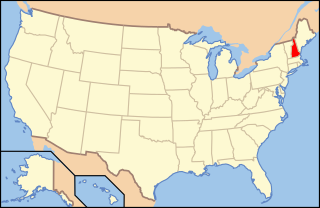
Lesbian, gay, bisexual, transgender, and queer (LGBTQ) people in the U.S. state of New Hampshire enjoy the same rights as non-LGBTQ people, with most advances in LGBT rights occurring in the state within the past two decades. Same-sex sexual activity is legal in New Hampshire, and the state began offering same-sex couples the option of forming a civil union on January 1, 2008. Civil unions offered most of the same protections as marriages with respect to state law, but not the federal benefits of marriage. Same-sex marriage in New Hampshire has been legally allowed since January 1, 2010, and one year later New Hampshire's civil unions expired, with all such unions converted to marriages. New Hampshire law has also protected against discrimination based on sexual orientation since 1998 and gender identity since 2018. Additionally, a conversion therapy ban on minors became effective in the state in January 2019. In effect since January 1, 2024, the archaic common-law "gay panic defence" was formally abolished; by legislation implemented within August 2023.

The transgender rights movement is a movement to promote the legal status of transgender people and to eliminate discrimination and violence against transgender people regarding housing, employment, public accommodations, education, and health care. A major goal of transgender activism is to allow changes to identification documents to conform with a person's current gender identity without the need for gender-affirming surgery or any medical requirements, which is known as gender self-identification. It is part of the broader LGBT rights movements.
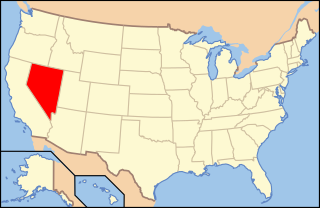
Lesbian, gay, bisexual, transgender, and queer (LGBTQ) people in the U.S. state of Nevada enjoy the same rights as non-LGBTQ people. Same-sex marriage has been legal since October 8, 2014, due to the federal Ninth Circuit Court of Appeals ruling in Sevcik v. Sandoval. Same-sex couples may also enter a domestic partnership status that provides many of the same rights and responsibilities as marriage. However, domestic partners lack the same rights to medical coverage as their married counterparts and their parental rights are not as well defined. Same-sex couples are also allowed to adopt, and state law prohibits unfair discrimination on the basis of sexual orientation and gender identity, among other categories, in employment, housing and public accommodations. In addition, conversion therapy on minors is outlawed in the state.
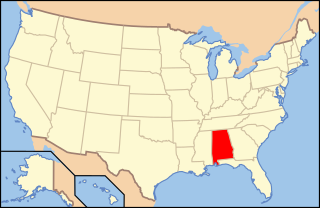
Lesbian, gay, bisexual, transgender, and queer (LGBTQ) individuals in the U.S. state of Alabama have federal protections, but still face legal challenges and discrimination on the state level that is not experienced by non-LGBT residents. LGBTQ rights in Alabama—a Republican Party stronghold located in both the Deep South and greater Bible Belt—are severely limited in comparison to other states. As one of the most socially conservative states in the U.S., Alabama is one of the only two states along with neighboring Mississippi where opposition to same-sex marriage outnumbers support.
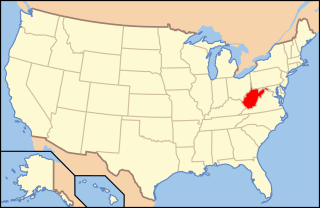
Lesbian, gay, bisexual, transgender, and queer (LGBTQ) people in the U.S. state of West Virginia face legal challenges not faced by non-LGBT persons. Same-sex sexual activity has been legal since 1976, and same-sex marriage has been recognized since October 2014. West Virginia statutes do not address discrimination on account of sexual orientation or gender identity; however, the U.S. Supreme Court's ruling in Bostock v. Clayton County established that employment discrimination against LGBTQ people is illegal.
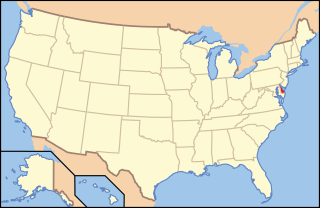
Lesbian, gay, bisexual, transgender, and queer (LGBTQ) people in the U.S. state of Delaware enjoy the same legal protections as non-LGBTQ people. Same-sex sexual activity has been legal in Delaware since January 1, 1973. On January 1, 2012, civil unions became available to same-sex couples, granting them the "rights, benefits, protections, and responsibilities" of married persons. Delaware legalized same-sex marriage on July 1, 2013.
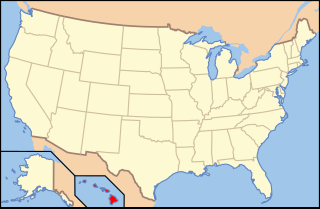
Lesbian, gay, bisexual, transgender, and queer (LGBTQ) people in the U.S. state of Hawaii enjoy the same rights as non-LGBTQ people. Same-sex sexual activity has been legal since 1973; Hawaii being one of the first six states to legalize it. In 1993, a ruling by the Hawaiʻi Supreme Court made Hawaii the first state to consider legalizing same-sex marriage. Following the approval of the Hawaii Marriage Equality Act in November 2013, same-sex couples have been allowed to marry on the islands. Additionally, Hawaii law prohibits discrimination on the basis of both sexual orientation and gender identity, and the use of conversion therapy on minors has been banned since July 2018. Gay and lesbian couples enjoy the same rights, benefits and treatment as opposite-sex couples, including the right to marry and adopt.
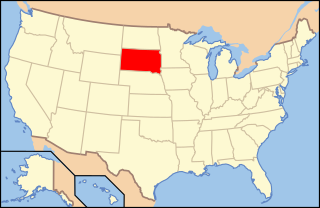
Lesbian, gay, bisexual, transgender, and queer (LGBTQ) people in the U.S. state of South Dakota may face some legal challenges not experienced by non-LGBTQ residents. Same-sex sexual activity is legal in South Dakota, and same-sex marriages have been recognized since June 2015 as a result of Obergefell v. Hodges. State statutes do not address discrimination on account of sexual orientation or gender identity; however, the U.S. Supreme Court's ruling in Bostock v. Clayton County established that employment discrimination against LGBTQ people is illegal under federal law.
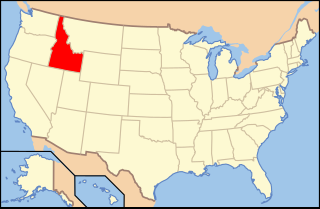
Lesbian, gay, bisexual transgender, and queer (LGBTQ) people in the U.S. state of Idaho face some legal challenges not experienced by non-LGBTQ people. Same-sex sexual activity is legal in Idaho, and same-sex marriage has been legal in the state since October 2014. State statutes do not address discrimination based on sexual orientation and gender identity; however, the U.S. Supreme Court's ruling in Bostock v. Clayton County established that employment discrimination against LGBTQ people is illegal under federal law. A number of cities and counties provide further protections, namely in housing and public accommodations. A 2019 Public Religion Research Institute opinion poll showed that 71% of Idahoans supported anti-discrimination legislation protecting LGBTQ people, and a 2016 survey by the same pollster found majority support for same-sex marriage.
The Gender Expression Non-Discrimination Act (GENDA) is a 2019 New York law which added gender identity and gender expression to the state's human rights and hate crimes laws as protected classes; banned discrimination in employment, housing, and public accommodations based on gender identity and gender expression; and provided enhanced penalties for bias-motivated crimes. GENDA was first introduced in 2003. The bill passed the New York State Assembly every year from 2008 to 2019, but did not receive a floor vote in the New York State Senate until January 2019. It was passed by each house of the New York State Legislature on January 15, 2019, and New York Gov. Andrew Cuomo signed it into law on January 25, 2019.

Sarah Elizabeth McBride is an American activist and politician who has been a Democratic member of the Delaware Senate since January 2021. She was previously the National Press Secretary of the Human Rights Campaign. She won in the November 2020 election in the safely Democratic 1st Delaware State Senate district. As the first openly transgender state senator in the country, she is the highest-ranking transgender elected official in United States history.

The Equality Act was a bill in the United States Congress, that, if passed, would amend the Civil Rights Act of 1964 to prohibit discrimination on the basis of sex, sexual orientation and gender identity in employment, housing, public accommodations, education, federally funded programs, credit, and jury service. The Supreme Court's June 2020 ruling in Bostock v. Clayton County protects gay and transgender people in matters of employment, but not in other respects. The Bostock ruling also covered the Altitude Express and Harris Funeral Homes cases.
A bathroom bill is the common name for legislation or a statute that denies access to public toilets by gender or transgender identity. Bathroom bills affect access to sex-segregated public facilities for an individual based on a determination of their sex as defined in some specific way, such as their sex as assigned at birth, their sex as listed on their birth certificate, or the sex that corresponds to their gender identity. A bathroom bill can either be inclusive or exclusive of transgender individuals, depending on the aforementioned definition of their sex.

An Act to amend the Canadian Human Rights Act and the Criminal Code is a law passed in 2017 by the Parliament of Canada. It was introduced as Bill C-16 of the first session of the 42nd Parliament. The law adds gender expression and gender identity as protected grounds to the Canadian Human Rights Act, and also to the Criminal Code provisions dealing with hate propaganda, incitement to genocide, and aggravating factors in sentencing.
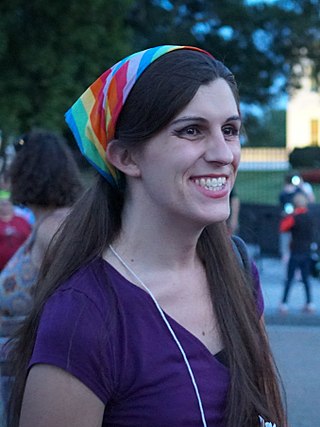
Danica A. Roem is an American journalist and politician who has served in the Virginia Senate since 2024. A Democrat, she represents the 30th district covering part of Prince William County including the cities of Manassas and Manassas Park. She previously served in the Virginia House of Delegates representing the 13th district from 2018-2024.

The Massachusetts Gender Identity Anti-Discrimination Initiative is a state-wide referendum passed by Massachusetts voters in the 6 November 2018 mid-term election that prohibits discrimination in public accommodations on the basis of gender identity. The vote upholds language which was already present in the state anti-discrimination statute, defeating an attempt to veto it by public referendum. It is the first state-wide anti-discrimination statute passed by referendum supporting transgender rights in the United States.

Fairness West Virginia is the statewide lesbian, gay, bisexual and transgender (LGBT) civil rights organization for the U.S. state of West Virginia. Founded in 2009 by Stephen Skinner, the organization is currently headed by Andrew Schneider and is headquartered in downtown Charleston.
















